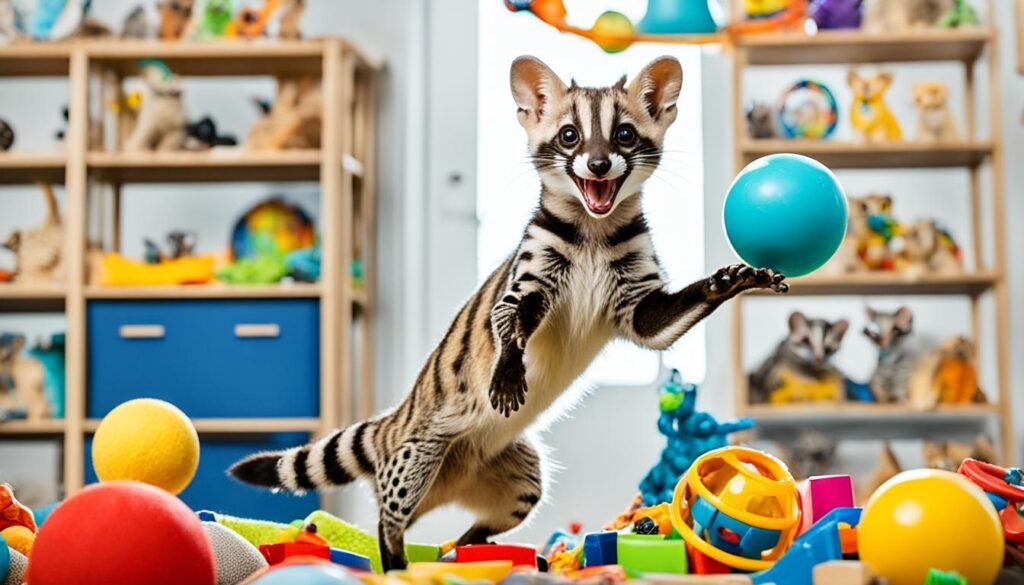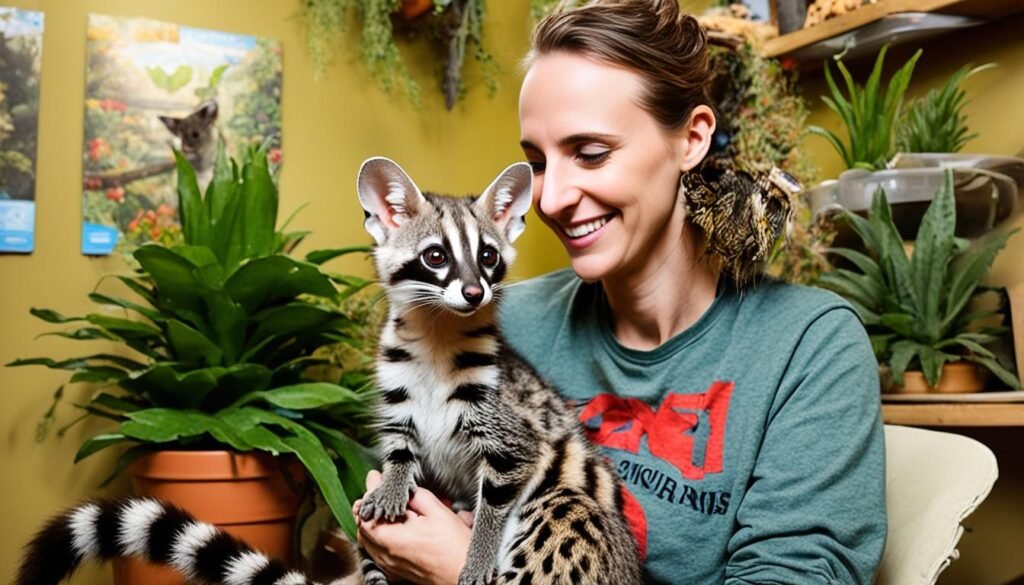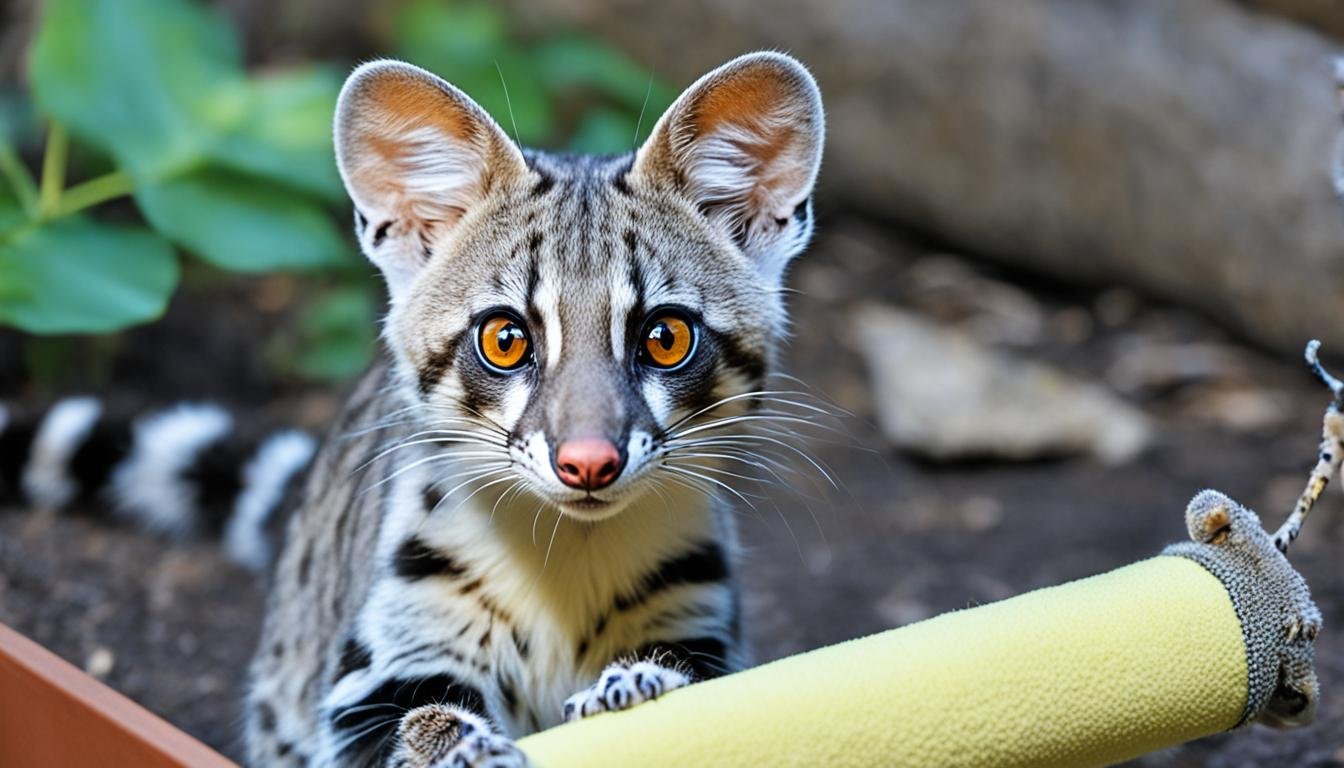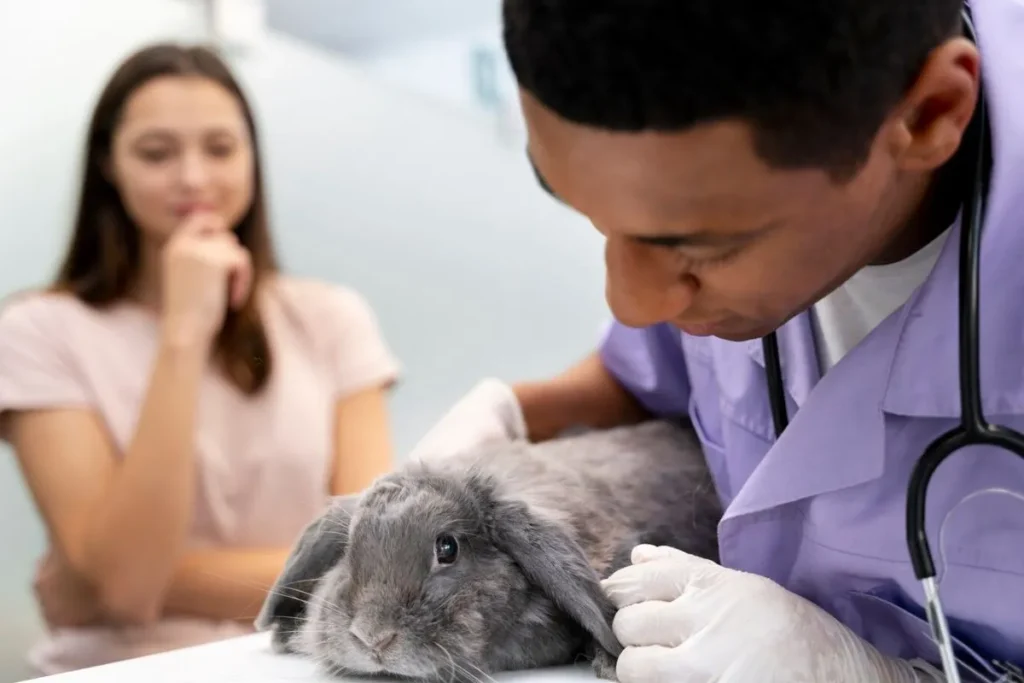Genets, the captivating members of the Viverridae family, have gained popularity as exotic pets in recent years. These fascinating creatures, native to Africa and parts of Europe, possess a unique blend of intelligence, agility, and charm that captivates animal enthusiasts worldwide.
However, successfully integrating genets into a domestic environment requires a delicate balance of patience, understanding, and effective socialization techniques. In this comprehensive guide, we’ll explore the essential steps to build trust, create a strong bond, and raise friendly genets that thrive in a home setting.
Key Takeaways
- Understand the unique needs and social structure of genets to provide a safe and enriching environment.
- Start the socialization process early and be patient, using positive reinforcement training to build trust.
- Develop proper handling techniques and gradually introduce genets to new people to ensure their comfort and security.
- Allocate ample time for playtime, interactive activities, and supervised outdoor exploration to meet their social needs.
- Seek professional guidance from experienced genet owners or wildlife experts to ensure the well-being of your exotic pet.
Understanding the Unique Needs of Genets
Genets are fascinating exotic pets, but they come with unique challenges and considerations. As carnivorous mammals, genets have specific dietary, environmental, and social requirements that must be met to ensure their well-being.
Understanding the nuances of Genet Behavior and Genet Social Needs is crucial for providing them with the proper care and creating a safe, enriching habitat.
Genets as Exotic Pets
While genets have gained popularity as exotic pets, they are not domesticated animals and require specialized care. Their natural instincts, agility, and curious nature can present unique challenges for pet owners. Proper Genet Domestication is essential to ensure the safety and happiness of both the pet and its caretakers.
Genet Behavior and Social Structure
Genets are highly social creatures, living in complex family groups in the wild. Their Genet Behavior is characterized by a strong need for interaction, exploration, and environmental enrichment. Genets are also known to be skilled climbers and have a natural inclination to mark their territory, which must be considered when creating their living space.
- Genets are naturally curious and playful, requiring ample opportunities for physical and mental stimulation.
- They are highly social animals and may become stressed or anxious if kept in isolation, emphasizing the importance of Genet Social Needs.
- Genets have a unique scent-marking behavior that should be taken into account when designing their enclosure and enrichment.
Understanding the unique characteristics and needs of genets is essential for providing them with the best possible care as exotic pets. By addressing their Genet Behavior, Genet Domestication, and Genet Social Needs, pet owners can create a safe, enriching environment where genets can thrive.
Creating a Safe and Enriching Environment
Providing a secure and enriching habitat is the foundation for successful genet socialization. These fascinating exotic pets have unique needs that must be carefully considered when setting up their living space.
By creating a species-appropriate environment that caters to their natural behaviors and instincts, you can lay the groundwork for building trust and bonding with your genet.
One of the key aspects of creating a safe and enriching environment for genets is the enclosure setup. These agile, arboreal animals require ample vertical space with sturdy branches and perches to climb and explore. The enclosure should also offer hiding spots and areas for privacy, as genets can be shy and prefer to have the option to retreat when needed.
In addition to the physical setup, it is crucial to provide genet-appropriate enrichment. This can include a variety of interactive toys, puzzle feeders, and opportunities for natural foraging and exploration. Keeping your genet mentally and physically stimulated will help reduce stress and promote a healthy, friendly disposition.
Maintaining a clean, stress-free living environment is also essential for genets. Consistent and proper cleaning, as well as monitoring temperature, humidity, and lighting levels, can all contribute to the overall well-being of these exotic pets.
By creating a safe, enriching, and species-appropriate habitat, you can set the stage for successful genet socialization and the development of a strong bond between you and your genet.
| Enclosure Requirements | Enrichment Ideas |
|---|---|
|
|
Socialization Tips for Genets
Effective socialization is essential for genets, as it helps them become more comfortable, confident, and trusting around their human caregivers. To ensure your genet’s well-being, it’s crucial to start the socialization process early and maintain patience throughout the journey.
Start Early and Be Patient
Genets are naturally curious and can form strong bonds with their owners, but this takes time and consistent effort. Begin socializing your genet as soon as possible, exposing them to gentle handling, affectionate touches, and positive reinforcement. Remember, each genet has a unique personality, so be patient and adjusts your approach accordingly.
Positive Reinforcement Training
Utilizing positive reinforcement training techniques is an effective way to build a strong bond with your genet and encourage desired behaviors. Reward-based training helps genets associate positive experiences with interactions with their human caregivers, fostering trust and cooperation. Consistently reinforce behaviors you want to see more of, such as calmly accepting handling or responding to their name.
| Socialization Tips for Genets | Benefits |
|---|---|
| Start Early and Be Patient | Helps genets become more comfortable and trusting around humans |
| Positive Reinforcement Training | Builds a strong bond and encourages desired behaviors |
By incorporating these Socialization Tips for Genets, you can create a nurturing environment that fosters trust, confidence, and a deep connection between you and your exotic pet.
Handling and Introducing Genets to Humans
Handling Genet Pets and Introducing Genets to Humans with care and caution is essential for the well-being and socialization of these captivating exotic animals. Proper handling techniques and gradual introductions to new people can help ensure a positive experience for both the genet and the human.
Proper Handling Techniques
When handling a genet, it’s crucial to approach the animal with a calm and confident demeanor. Genets are naturally curious and may become stressed or defensive if handled roughly or suddenly. To ensure a positive interaction:
- Move slowly and avoid sudden movements that could startle the genet.
- Support the animal’s body weight evenly, using both hands to provide a secure and comfortable grip.
- Avoid restraining the genet’s head or limbs, as this can cause distress.
- Never attempt to pick up a genet by the scruff of the neck, as this can be painful and dangerous for the animal.
Introducing Genets to New People
Gradually introducing Genets to Humans is crucial for building trust and ensuring a positive experience for both parties. When a new person wants to interact with a genet, follow these steps:
- Start by allowing the genet to observe the new person from a distance, without any direct interaction.
- Offer the genet a treat or toy while the new person is present, reinforcing the positive association.
- Encourage the new person to sit or stand calmly near the genet, avoiding direct eye contact or sudden movements.
- Over time, gradually allow the new person to offer the genet treats or gently pet the animal, with the owner’s supervision.
- Always respect the genet’s comfort level and never force an interaction that the animal is not ready for.
By following these Handling Genet Pets and Introducing Genets to Humans techniques, you can help your genet feel safe, secure, and comfortable in new situations, paving the way for a strong bond and positive interactions with both familiar and unfamiliar people.
Building Trust and Bonding with Your Genet
Developing a strong bond and trust with your genet is the ultimate goal of the socialization process. By implementing proven Genet Socialization Techniques, you can create a lasting, positive relationship with your exotic pet.
From consistent interaction and positive reinforcement to respecting their individual personality and needs, these strategies will help you build a trusting bond with your genet.
One of the key elements in Raising Friendly Genets is patience and consistency. Genets are intelligent creatures, and they respond best to a gentle, reward-based approach. Start by spending regular, short periods of time with your genet, allowing them to become accustomed to your presence and gradually build trust.
- Offer your genet favorite treats and engage in positive interactions, such as gentle petting or playtime, to associate your presence with pleasant experiences.
- Respect your genet’s personal space and avoid forcing interactions, as this can undermine the trust-building process.
- Be patient and consistent in your approach, as it may take time for your genet to fully warm up to you.
Positive reinforcement training is another effective technique for Genet Socialization Techniques. By rewarding desired behaviors, such as coming when called or accepting gentle handling, you can encourage your genet to associate these actions with positive outcomes. This approach helps build trust and fosters a cooperative relationship between you and your pet.
Remember, every genet is unique, and understanding their individual personality and needs is crucial for Raising Friendly Genets. Observe your genet’s cues and tailor your interactions accordingly, ensuring that they feel safe, comfortable, and valued in your presence.
By implementing these strategies and maintaining a patient, caring approach, you can develop a strong, trusting bond with your genet, creating a fulfilling and rewarding relationship with your exotic pet.
Genet Social Needs: Playtime and Interaction
As highly social and active animals, genets have specific needs when it comes to playtime and interaction. Meeting these needs is crucial for promoting a healthy, well-adjusted genet and strengthening the bond between you and your pet.
Interactive Toys and Activities
Genets are curious and intelligent creatures that thrive on mental and physical stimulation. Providing interactive toys and activities is an excellent way to fulfill their Genet Behavior and keep them engaged. Consider offering a variety of toys, such as puzzle feeders, climbing structures, and chew toys, to encourage natural foraging and problem-solving behaviors.
- Puzzle feeders that require your genet to manipulate the toy to retrieve treats
- Climbing structures and platforms to satisfy their natural arboreal tendencies
- Chew toys made of safe, durable materials to satisfy their need to gnaw
Supervised Outdoor Time
In addition to indoor playtime, Genet Social Needs also include the opportunity for supervised outdoor exploration. Carefully monitor your genet during these outdoor adventures to ensure their safety and prevent any unwanted behaviors.
This outdoor time allows them to engage in natural behaviors, such as climbing, foraging, and socializing, which can greatly contribute to their overall well-being.

By providing a variety of interactive toys, activities, and supervised outdoor time, you can help fulfill your genet’s social and behavioral needs, leading to a happier, healthier, and more well-adjusted pet.
Raising Friendly and Well-Adjusted Genets
Nurturing a friendly and well-adjusted genet requires a comprehensive approach that caters to their unique needs, behaviors, and socialization requirements. By focusing on early training, positive reinforcement, and creating a stimulating environment, pet owners can cultivate a confident and sociable genet that thrives as a beloved companion.
To raise a friendly genet, it’s crucial to start the socialization process as early as possible. Introducing the genet to various sights, sounds, and experiences in a calm and positive manner helps them develop confidence and trust. Consistent handling by the primary caregiver, combined with Genet Socialization Techniques, can shape a genet’s personality and temperament.
- Accustom the genet to human interaction through gradual exposure and gentle handling from a young age.
- Provide a variety of enriching toys and activities to keep the genet mentally stimulated and engaged.
- Reinforce desirable behaviors with positive reinforcement, such as treats and praise, to encourage a friendly disposition.
By prioritizing the Raising Friendly Genets approach, pet owners can foster a strong bond with their genet and ensure they grow into well-adjusted, confident companions. With patience, consistency, and a focus on the genet’s unique needs, pet owners can unlock the true potential of these fascinating exotic animals.
Remember, each genet is an individual, and their socialization journey may vary. Staying attuned to their cues and adapting the approach accordingly is key to building a lasting, harmonious relationship with your genet.
Potential Challenges and Solutions
Socializing and caring for genets can present unique challenges, but with the right approach, you can overcome common obstacles and maintain a healthy, trusting relationship with your exotic pet. From addressing genet behavior issues to managing difficult situations, this section provides valuable guidance to help you navigate the socialization process.
One of the primary challenges in handling genet pets is their natural curiosity and tendency to be active throughout the day. Genets are highly intelligent and can become bored easily, leading to destructive behaviors. To address this, it’s crucial to provide a stimulating and enriched environment, with plenty of interactive toys and opportunities for supervised outdoor exploration.
Another common challenge is the genet’s natural wariness towards unfamiliar people. Genets may display aggressive or defensive behaviors when introduced to new individuals. To build trust and overcome this, it’s essential to use positive reinforcement training, start the socialization process early, and always approach the genet calmly and patiently.
Occasionally, genets may exhibit challenging behaviors, such as biting or scratching. In these situations, it’s important to remain calm, avoid punishing the genet, and instead focus on positive reinforcement and gradual desensitization. Consulting with a veterinarian or an experienced exotic animal behaviorist can also provide valuable guidance on addressing specific behavioral issues.
By understanding the unique needs of genets and implementing the right strategies, you can navigate the socialization process with confidence and enjoy a rewarding relationship with your exotic pet.
Socialization Tips for Genets: A Recap
As we’ve explored throughout this article, socialization is key to building a strong, trusting bond with your genet. By understanding their unique needs, creating a safe and enriching environment, and implementing positive reinforcement training, you can help your exotic pet thrive and become a well-adjusted, friendly companion.
Let’s review the essential socialization tips for genets:
- Start early and be patient. Genets require consistent, gentle handling from a young age to become comfortable with human interaction.
- Use positive reinforcement. Reward-based training helps genets associate humans with positive experiences, fostering trust and cooperation.
- Introduce genets to new people gradually. Slowly acclimate your pet to unfamiliar faces and voices to prevent stress or fear.
- Provide ample playtime and interaction. Engage your genet in interactive toys and activities, as well as supervised outdoor time, to meet their social needs.
- Be mindful of potential challenges. Address any behavioral issues, such as aggression or fear, with patience and professional guidance.
By following these Socialization Tips for Genets, you’ll be well on your way to creating a strong, lifelong bond with your exotic companion. Remember, with time, patience, and a commitment to their welfare, you can build a trusting, enriching relationship that will bring joy to both you and your genet.

| Socialization Tip | Description |
|---|---|
| Start Early and Be Patient | Genets require consistent, gentle handling from a young age to become comfortable with human interaction. |
| Use Positive Reinforcement | Reward-based training helps genets associate humans with positive experiences, fostering trust and cooperation. |
| Introduce Genets to New People Gradually | Slowly acclimate your pet to unfamiliar faces and voices to prevent stress or fear. |
| Provide Ample Playtime and Interaction | Engage your genet in interactive toys and activities, as well as supervised outdoor time, to meet their social needs. |
| Be Mindful of Potential Challenges | Address any behavioral issues, such as aggression or fear, with patience and professional guidance. |
Seeking Professional Guidance
While this guide provides comprehensive information on socializing and caring for genets, it’s important to seek guidance from professional veterinarians, experienced genet owners, and reputable exotic animal organizations. Staying up-to-date on the latest research and best practices is crucial when it comes to handling genet pets and ensuring their well-being.
Consulting with a veterinarian who specializes in genet behavior and genet domestication can help you address any specific health or behavioral concerns. They can also provide personalized advice on creating a safe and enriching environment for your genet, as well as offer guidance on proper handling techniques and socialization strategies.
In addition, connecting with experienced genet owners and joining reputable exotic animal organizations can be invaluable. These resources can offer practical insights, share their own successes and challenges, and help you navigate the unique aspects of genet care and genet ownership.
- Consult with a veterinarian who specializes in exotic animals, particularly genets
- Connect with experienced genet owners and join exotic animal organizations
- Stay up-to-date on the latest research and best practices for genet care and genet socialization
By seeking guidance from professionals and staying informed, you can ensure the health, happiness, and well-being of your beloved genet pet. Remember, responsible genet ownership is essential for building a strong, trusting bond with these fascinating creatures.
Conclusion
In the end, socializing and developing trust with genets requires unwavering patience, dedication, and a deep understanding of their unique behaviors and needs. By following the effective strategies outlined in this comprehensive guide, you can create a safe, enriching environment and forge a strong, lasting bond with your exotic pet. Remember, with the right approach, genets can make rewarding and delightful companions.
Ultimately, the Socialization Tips for Genets shared here emphasize the importance of early exposure, positive reinforcement training, and mindful handling techniques.
By recognizing the Genet Behavior and social structure, you can tailor your approach to build trust and raise Friendly Genets that thrive in your care.
With patience and diligence, you can navigate the potential challenges and unlock the joy of coexisting with these fascinating creatures. By seeking professional guidance when needed, you can ensure your genet’s well-being and maximize the rewarding experience of pet ownership.
FAQ
What are some important considerations when keeping genets as pets?
Genets have unique needs and behaviors that must be taken into account when keeping them as pets. They require a secure, stimulating environment, a species-appropriate diet, and specialized care to thrive. Potential owners should research the challenges and responsibilities of genet ownership before bringing one into their home.
How can I create a safe and enriching habitat for my genet?
Providing a safe and enriching environment is crucial for genet socialization and well-being. This includes setting up a secure enclosure, incorporating appropriate hiding spots and climbing structures, and offering a variety of stimulating toys and activities to keep them physically and mentally engaged.
When should I start socializing my genet, and what techniques are effective?
It’s best to start the socialization process with your genet as early as possible, preferably from a young age. Patience and positive reinforcement training are key, as these techniques help build trust and encourage desired behaviors over time. Gradual introductions to new people and environments are also important for successful genet socialization.
How do I properly handle and introduce my genet to new people?
Proper handling techniques and gradual introductions to new people are essential for the well-being and socialization of genets. Always approach your genet calmly and use secure, gentle methods. Introduce new individuals slowly and in a controlled, positive manner to help your genet feel safe and comfortable.
What are some effective ways to build trust and bond with my genet?
Developing a strong bond and trust with your genet is the ultimate goal of the socialization process. Consistent, positive interaction, providing enrichment activities, and respecting your genet’s individual needs and personality are all key to building a lasting, trusting relationship.
How can I ensure my genet’s social needs are met?
Genets are highly social animals with specific needs for playtime and interaction. Providing engaging toys, activities, and supervised outdoor time can help stimulate and fulfill their natural social and behavioral requirements. Meeting these needs is crucial for promoting a healthy, well-adjusted genet.
What are some common challenges in socializing genets, and how can I overcome them?
Socializing and caring for genets can present unique challenges, such as addressing behavioral issues or managing difficult situations. By being proactive, seeking professional guidance, and maintaining patience and consistency, you can navigate these obstacles and maintain a healthy, trusting relationship with your genet.



